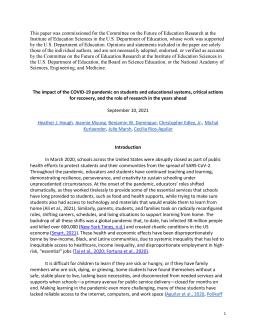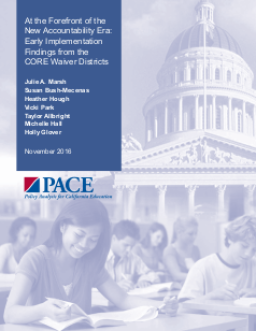How School Districts Craft Coherence Towards Continuous Improvement
Published
Summary
This study uses qualitative case study methods to explore how educators establish system-wide continuous improvement capabilities and coherence for implementation, taking into consideration the local contexts. Educators use two bridging approaches to crafting coherence: weaving and stacking. The study contributes to understanding how leaders create shared meaning and practice in complex and dynamic educational systems. The implications for both research and practice are discussed.
Insights From California’s CORE Waiver Districts
Published
Summary
California's Local Control Funding Formula (LCFF) aims to improve educational equity by providing additional funds to districts with disadvantaged students. Districts are required to engage with their communities and develop Local Control Accountability Plans (LCAPs) to identify priorities and allocate funds. However, there are concerns about the quality of LCAPs, lack of stakeholder involvement, and limited transparency. To improve the effectiveness of LCFF, districts must ensure meaningful stakeholder engagement and use data to guide decision-making.
Learning from the CORE Districts' Focus on Measurement, Capacity Building, and Shared Accountability
Published
Summary
California and the US are undergoing a cultural shift in school accountability policies towards locally-determined measures of school performance. Lessons can be learned from the CORE districts, which developed an innovative accountability system, emphasizing support over sanctions, and utilizing multiple measures of school quality. The CORE districts' measurement system and collaboration hold promise for improving local systems, but efforts to build capacity remain a work in progress.


